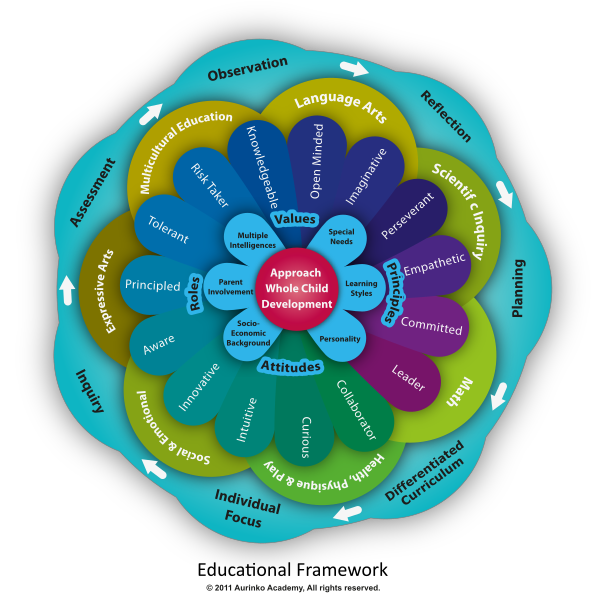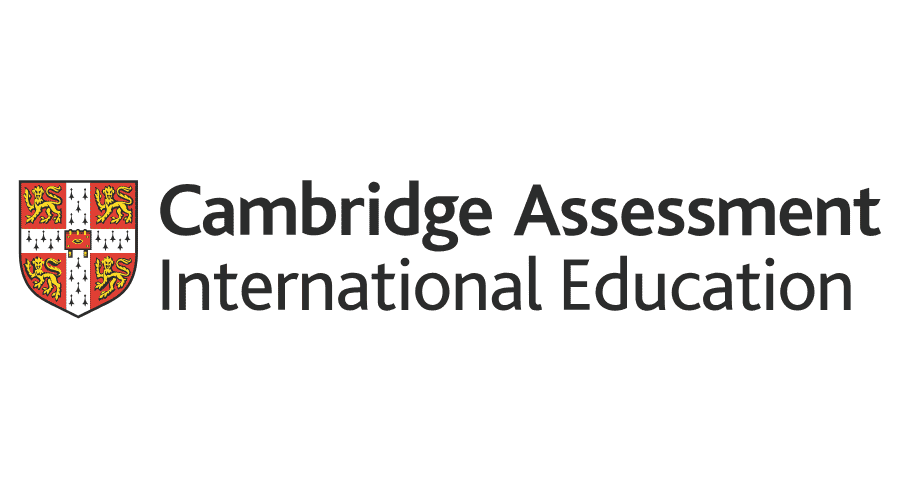Aurinko’s
Educational Framework
Aurinko Academy’s school curriculum is inspired by the Co-Constructivist theory, the Universal Laws of Karma, Teachings of Great Gurus, the Ancient Indian Gurukul System and a widely researched and successful approach devised by its founders.
The Academic Framework is Supported by Cambridge Programs.
What drives it?
The Aurinko school curriculum illustrates Aurinko Academy’s educational approach and the inter-relationship between various areas of curriculum, child development, attitudes, values and the methodology adapted.
The Educational Framework depicts what we enable children, families, and teachers to cover and uncover throughout their tenure at Aurinko Academy.

The Aurinko school curriculum content spans through Academic, Social, Emotional, Cognitive, Community and Physical Areas. Through different curriculum clusters that is supported by the Cambridge Board and the Aurinko Philosophy, the children traverse their curriculum. The teachers offer different ways of understanding ideas and integrating content by exploring and applying one concept in more than one environment with different tools or provocations.
This also supports children and adults in seeing different perspectives to create and think with concepts and materials to apply learned skills.
The Aurinko Curriculum Clusters
Language Arts
Other than the required skills of reading, writing, listening, language, and literature, the curriculum serves the higher purpose of:
- expressing ideas,
- extracting meaning,
- enhancing critical thinking, and
- connecting with others.
This process is designed to teach children to think independently and to use their growing intellect to face the challenges of the digital age.
Children are able to interpret the messages and values contained within many popular forms of media. They also learn to understand the agendas behind them.
As they move through the grades, they develop more sophisticated mastery of literacy. Our differentiated instructions ensure that each child learns and contributes in the areas of his strengths and gets ample (liberal/ sufficient) time to work on the deficits, if any.
Expressive arts
Teachers identify ways in which children learn through specific media. They then, scaffold each student’s development of multiple competencies.
Later in the student’s learning, as children become more analytical, they explore responses and are able to deconstruct work as well as create it.
Expressive Arts provide children the opportunity to communicate their thoughts, ideas and feelings. It encompasses music, movement, visual arts, studio art, dramatic art and play.
Mathematics
Aurinko attempts to develop a mathematical mind in its children.
Patterns/ Rhythms
Patterns/Rythms of the human body can be applied to the world we around us. Concepts of left-right/ me-you, build strong concept understanding.
Application
Children’s mathematical understanding is applied to the world around them. This enables them to express not only objects and their absence, but also to represent forms and equations aligned with rules and ideas.
Maths as a discipline
Math concepts provide domains for children to reach an understanding on a deeper level with geometry and algebra, while learning the tools and applications that activate these ideas. Applying these mathematical domains to projects, problem-solving, and planning on an experiential level supports multiple ways of learning and embeds skill development.
Math at Aurinko starts with asking daily life questions, trying various methods to meet that need and understanding the existing solutions like graphs, calendars, surveys, temperatures, quantities, time.
Scientific Inquiry
The content areas of scientific inquiry get children to engage their natural curiosity, challenge them to seek answers and explore the world around them.
This process begins with a question and follows the path of inquiry. Together teachers and children explore, document, reflect and record findings as they ask questions, conduct research, make observations, formulate and test hypotheses.
As the children move from grade to grade, fundamental scientific topics with increasing complexity are introduced and developed, building upon the skills and knowledge they have learned.
Social and Emotional Learning
Social and emotional learning are key elements of our work at Aurinko Academy, sometimes more than academic skill sets. These areas strongly affect cognitive growth. When children have the skills to self-regulate and solve problems on their own, they are better prepared as learners and collaborators.
Social skills and competencies enable children to be more successful in school and in life. Social-emotional skills are the common threads that tie our entire curriculum together, since we learn together as a community.
The social negotiation, discussion, and conflict found in peer relationships help children learn to understand the thoughts, emotions, motives, and intentions of others. As they develop and extend their ability to see or understand someone else’s point of view, they identify strategies that can be used to address difficult situations.
Children support each other’s social and emotional skills as they make these adjustments using negotiation, collaboration, cooperation, turn-taking, and sharing. In turn, they develop greater self-confidence, self-esteem, and the willingness to take risks.
Teachers and parents, as appropriate, facilitate social emotional learning processes. The skills developed in this content area influence cognitive skills and are directly related to academic achievement and learning. Cognitive and social-emotional developments are complementary, mutually supportive areas of growth and learning.
Physical Awareness, Health and Play
At Aurinko, teachers constantly look for creative ways to incorporate physical activity and health into all other areas of the curriculum and into emerging threads of interest so that children experience their bodies as powerful agents of exploration and expression.
During play, children are free to risk doing things that they are not yet confident they can do well.
By practicing skills or trying out ideas within a play situation, children become better able to handle real situations. The children participate in activities and games designed to support exercise that is enjoyable and develops physical skills.
While exploring this content area, teachers and children take advantage of multiple spaces including soft spaces, indoor spaces, playground, local community spaces, and the surrounding neighbourhood.
Our curriculum encourages complex forms of play, which research shows helps children develop language skills, empathy, and a subtle capacity to know the needs of others.
Social Sciences
Teachers look for and create opportunities for relating social sciences to real life. This study plays a critical role in deepening children’s understanding of how their world works. Children get to explore their identity and their relationships.
This is extended to exploring characteristics and experiences, past and present, of diverse cultures and populations of the world.
Aurinko Teaching and Assessment Cycle
At Aurinko, we believe that it is not only adults who have something to transmit from their prior learning to children who are learning for the first time, but that it is mutual. Our methodology springs from the Socio-constructivist Approach in education. Our processes are such that the adult may be a facilitator, but both the adult and child are designated as learners.
At Aurinko Academy, student assessments provide an illustration of a child’s learning process as well as a perspective on the overall holistic learning of the child. Over time, these documents become an overall narrative of a child’s learning history. Assessments and respective rubrics of various types – projects/quizzes, presentations are created with great care. Assessment/ marking is transparent, detailed, informative, and constructively critical so that the students may be able to reflect on and learn from their performance.
The bulk of our assignments is the information that teachers collect information tracing the experiences and the cycles of learning that occur over the course of the day and the week. These are complemented by more specific and targeted assessments are designed to follow up on equally specific questions or inquiries. Gathering evidence of these areas of learning fine tunes our pedagogy and curricular content.
Aurinko Children are aware of learning as a constant process, understand different ways to learn, and facilitate learning from others.
Children form an integral part of the assessment process as they process and learn skills, research tools and different ways to collect data and information on what they know and how they learn. In this way children and Teachers co-construct the Assessment Process.
The process of Inquiry begins with asking a question or exploring a thread. Its purpose is to make visible and evaluate the holistic learning process that takes place every day in every classroom. The Observation Stage spans the entire learning process in the class, during field trips, in the workshops, etc. Teachers also observe and record each child’s unique Learner Profile during this process. The Planning Stage is an intensive phase where the teachers map the child’s unique educational needs, strengths and weaknesses to the questions that have been raised during the Observation phase which include field, anecdotal and monitoring notes, documentation, and development of portfolios. It is followed by reflection upon children’s work to individualize and differentiate instruction.
Thus at Aurinko Academy, Assessment in turn drives curricular content, teaching strategies, re-assessment, and differentiation of instruction.

Aurinko Academy and the Cambridge Board together encourage personal growth and wellbeing. Cambridge learners build subject knowledge and conceptual understanding, and develop a broad range of skills, learning habits and attributes to help make them ready for the world. Aurinko Philosophy connects children to people, places and experiences and links it to learning outcomes that result in knowledge and skill building.
At Aurinko Academy, we’ve built a strong foundation in fostering a love of learning through real-world experiences. Our curriculum goes a step further by incorporating the internationally recognized Cambridge programs.
This powerful combination ensures your child continues to benefit from the enriching connections we make between the classroom and the world around them. They’ll delve deeper into core subjects with the Cambridge programs, solidifying their knowledge base while developing essential critical thinking skills.
This enriched curriculum isn’t just about preparing students for success in higher education; it’s about equipping them with the adaptability and intellectual agility to thrive in our ever-changing world.
By embracing this innovative curriculum update, Aurinko Academy empowers your child to become not just learners, but confident, future-ready individuals.
Why choose Cambridge and the Aurinko Methodology ?
- Internationally Recognised
- Research-Based
- Child Centric
- Builds Thinking Skills
- Builds Problem Solving Skills
- Builds Confidence
- Focusses on Activity Based Learning
- Helps Children Co-Construct Learning with the Teacher’s guidance
- Encourages Inquiry
- Encourages independence
- Homework is intelligent and promotes independence
- Creates opportunities in class for children to speak up, be unafraid
- Is structured to train the child to persist on tasks, write in their own words, like doing word problems in mathematics and complete their homework on their own
- Allows reflection at the end of a lesson to assimilate and express learning
